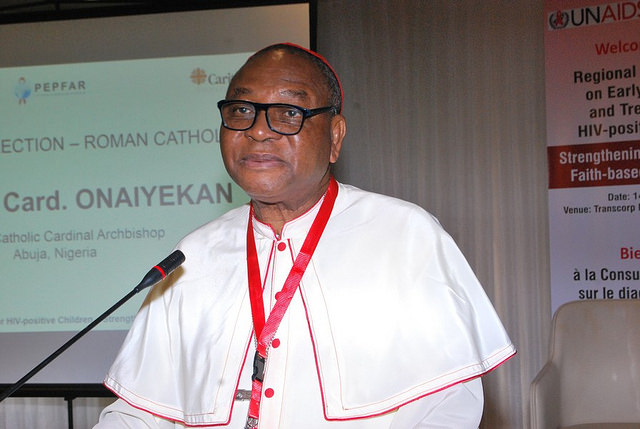A partnership between Caritas Internationalis, the US the U.S. President’s Emergency Plan for AIDS Relief (PEPFAR) and UNAIDS recently made it possible for key stakeholders to gather in Abuja, Nigeria and discuss the role of faith-based organisations in HIV prevention, care, treatment and support across Africa, with a focus on paediatric HIV.
Faith-based organisations in most countries have been at the forefront of providing HIV services at the grass roots level and in hard-to-reach communities. Caritas Internationalis Advocacy Officer on Health & HIV Stefano Nobile noted that, “Caritas began as the first faith organisation to start provision of HIV services in 1987”.
According to UNAIDS, about 1.8 million children are living with HIV and only 50 percent of them are accessing treatment services. In the past, not much attention has been paid to Paediatric HIV as has been with adult HIV. This is a huge challenge that must be addressed if we plan to end AIDS by 2030.

Cardinal John Onaiyekan said, “We all need to work together as different faiths, to share knowledge and pass on the right information to our congregations about HIV services to ensure that no child is born HIV positive, to ensure the right messages about HIV prevention and access to treatment services are shared with our congregations”.
In line with the ongoing work and efforts made towards “Ending AIDS by 2030” through different strategies like the “Start Free. Stay Free. AIDS Free.”, Caritas Internationalis, UNAIDS and PEPFAR, opted for the AIDS FREE.
The idea behind the AIDS free strategy is to increase access. Once access is increased, new transmissions can be prevented, consequently ending the epidemic. However, the deadline for super fast-tracking the AIDS free Paediatric strategy is 2018.
The consultation brought together over 120 participants from the Democratic Republic of Congo, Zimbabwe and Nigeria. The consultation saw an outpouring of action plans on how faith-based organisations could harness their various platforms and widespread facilities to achieve this acceleration.
Speaking about the engagement of religious leaders, Cardinal John Onaiyekan said that “religious leaders should use their influence positively rather than join the lot of those who use their platforms to spread wrong information about HIV, sometimes confusing their members who are HIV positive and preventing them from accessing treatment services by preaching miraculous healing to them”.
President of the Nigerian Islamic Medical Association Dr. Ismail Salisu said, “In most parts of Nigeria, especially in the north, inadequate awareness is a major barrier to accessing HIV services which in turn contributes to the spread of the disease”.
Caritas Nigeria director Fr. Evaristus Bassey who spoke on Best Practices to Overcome Gaps highlighted the Baby Shower Congregational approach which upscale Prevention of mother-to-child transmission (PMTCT) and early infant diagnosis. He challenged government to collaborate with FBOs along the building blocks of health systems strengthening.
From the numerous presentations that were made of programmes that are being implemented in the DRC, Zimbabwe and in Nigeria geared towards ending AIDS, it was evident that the contributions of faith-based organisations to health care services cannot be overemphasised, which encompasses addressing other diseases to supporting maternal & child health services and HIV prevention, care and treatment services.
Consequently, the different faiths and denominations that participated at the event, shared their unique experiences in providing HIV services and reaching thousands of people in hard-to-reach communities with the lean resources they have. Some of the programmes were focused on elimination of mother to child transmission.
Caritas Internationalis representative, Stefano Nobile said that the planned outcome of the consultation was to come up with three actionable points that faith-based organisations in each country could work on in order to ensure adequate attention is given to paediatric HIV services as we work towards an AIDS free generation.
The actionable points include; increasing demand creation for paediatric HIV services, strengthening institutional capacity of FBOs and ensuring better leadership and coordination mechanisms between faith-based organizations and government of each country.
As the consultation came to an end after three days, participants expressed their satisfactions about how much of a learning process this had been for them as they listened to what their peers were doing in each country.
